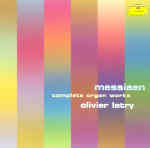Messiaen’s organ works run like a golden thread through his career, from its beginnings right up to its end. They thus offer the best way to trace the development of this remarkable composer’s personal musical language. Of course for those who couldn’t care less about such things, rest assured that despite their forbidding reputation, these largely meditative pieces contain plenty of immediately attractive, beautiful music. In fact, up until about 1951 when he embraced his own unique sort of 12-note technique (in Livre d’orgue), works such as L’ascension, La Nativité du Seigneur, the very Debussian Apparition de l’Eglise éternelle, Les corps glorieux, and the plainsong-based Messe de la Pentecôte offer little that’s more difficult than anything in the now-popular Turangalila-Symphonie or the Quartet for the End of Time (the last movement of which was actually borrowed from the Diptyque for organ). After that, life gets more complicated, but being able to take the pieces in chronological order certainly helps, and it’s worth noting that the aforementioned Livre d’orgue is about as purely “difficult” as Messiaen ever got.
Recordings of organ music depend for their success as much on the instrument as on the person playing it. A complete set of Messiaen’s organ music exists on the Jade label, performed by six different organists on the composer’s “own” instrument at Paris’ Trinity Church. Like that instrument, the organ in Notre-Dame Cathedral as it exists today is largely the product of the legendary French builder Aristide Cavaillé-Coll. It’s had its good days and bad over the centuries. Record collectors will recall a particularly excruciating outing in the early years of digital sonics when the instrument was tracked into Herbert von Karajan’s bloated rendition of Saint-Saëns’ Organ Symphony. On that occasion, listeners might be forgiven for thinking that the instrument was built by Pratt & Whitney rather than Cavaillé-Coll, but as recorded here it sounds splendid. There’s still that huge, reedy tone when the great organ blasts forth, but it no longer sounds like white noise, and definite pitches are seldom obscured, even in Messiaen’s most dense harmonic clusters.
Olivier Latry certainly has the chops for this music. Indeed, devotees might even criticize him for an excess of enthusiasm. After all, the one thing the organ can do as can no other instrument is sustain notes at even volume indefinitely, and Messiaen exploits this capability to the fullest. Latry’s, though, are generally swift performances. Compare him, for example, to Rudolf Innig (MDG) in Livre du Saint Sacrement, and he’s almost uniformly faster by a minute or two in each movement. For some, this inevitably will mean less awe-inspiring grandeur. For others, it will be a blessed relief and mean less aural fatigue over time (and for what it’s worth, Latry only requires six very well filled discs rather than most other sets’ seven). The relatively rapid speeds do entail a small sacrifice of rhythmic clarity in the most complex passages, such as the two trios in Livre d’orgue, but elsewhere Latry’s obvious enjoyment, wonderfully colorful registrations, and consistently shapely articulation certainly reward sustained attention. He’s helped by really fine recorded sound, roomy yet present, and completely lacking those irritating mechanical noises that figure so prominently in many other organ recordings. In short, Latry makes this music fall easily and gratefully on the ear, and that in itself is an achievement of the first order.
































